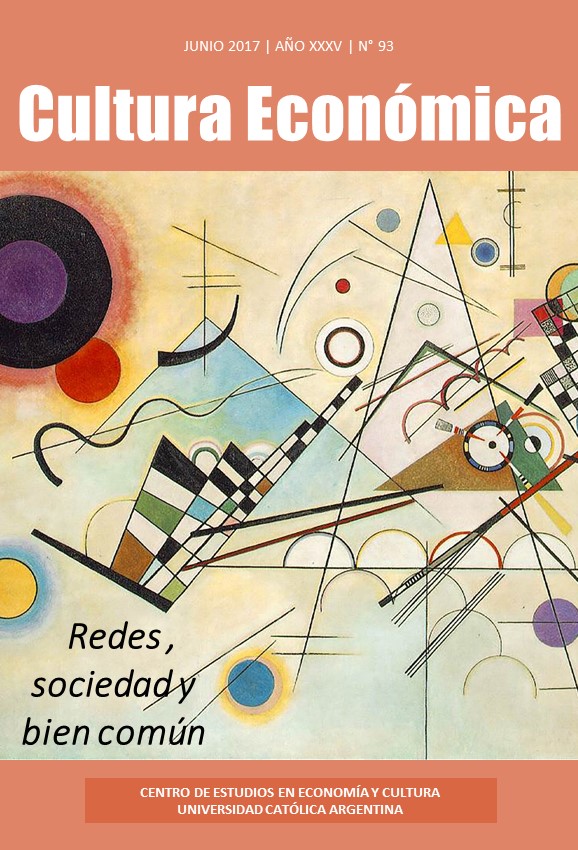You Will Be the Way You Think the Internet Is
Keywords:
INTERNET, NETWORKS, PHILOSOPHY OF TECHNOLOGY, ANTHROPOLOGYAbstract
This article intends to carry out an essay observation on some networks as an object of concrete and particular study: Internet and the Web. Several outcomes from these networks put forward new ways of being and new means of human interaction, on such a scale that they drive a paradigm change in the way in which we live together. This phenomenon will be analysed within the framework of Philosophy of Technology to explain those new dynamics. Finally, this paper will seek to propose networks new vital environments whose cultural features are linked to a new revolution in the way we understand ourselves as human beings.Downloads
References
Aibar, E. (1996). “La vida social de las máquinas: orígenes, desarrollo y perspectivas actuales en la sociología de la tecnología”, en Revista Española de Investigaciones Sociológicas, N°76, Octubre-Diciembre. Centro de Investigaciones Sociológicas. http://www.reis.cis.es/REISWeb/PDF/REIS_076_09.pdf Ultimo acceso: junio 2017
Aibar, E. (2008). “Las culturas de Internet: la configuración sociotécnica de la red de redes”, en Revista CTS, Nº 11, vol. 4, Julio, pp. 9-21.
Berners-Lee, T. (2007). “Levels of abstraction: Net, Web, Graph” http://www.w3.org/DesignIssues/Abstractions.html Ultimo acceso: junio 2017
Castells, M. (2001). La era de la información: economía, sociedad y cultura. Volumen II: “El poder de la identidad”. Siglo XXI Editores, Buenos Aires.
Feenberg, Andrew (1991). Critical Theory of Technology. Oxford University Press, Londres.
Fumero, A. Roca, G. Sáez Vacas, F. (2005). Web 2.0. Fundación Orange.http://www.fundacionorange.es/areas/25_publicaciones/
WEB_DEF_COMPLETO.pdf Ultimo acceso: junio 2017
Giuliano, G. (2007). Interrogar a la Tecnología: algunos fundamentos para el análisis crítico. Nueva librería, Buenos Aires.
Himanen, P. (2002). La ética del hacker y el espíritu de la era de la información. Destino, Barcelona.
Lawler, D. (2003). “Las funciones técnicas de los artefactos y su encuentro con el constructivismo social de la tecnología”, en Revista CTS N°1, vol. 1, Septiembre http://revistacts.net/files/
Volumen%201%20%20Número%201/art01.pdf Ultimo acceso: junio 2017
Lawler, D. (2008). “Una incursión ontológica al mundo de los productos de la acción técnica”, en ArtefaCToS Vol. 1, Nº 1, 4-17. Noviembre. http://campus.usal.es/~revistas/index.php/artefactos/
article/view/22/22 Ultimo acceso: junio 2017
Mumford, Lewis (1967). The myth of the machine. Harcourt, San Diego.
Peirone, Fernando (2012). Mundo Extenso. Fondo de Cultura Económica, Buenos Aires.
Pinch, T. y W. E. Bijker (1987). “The Social Construction of Facts and Artifacts: Or How the Sociology of Science and the Sociology of Technology Might Benefit Each Other”, en The Social Construction of Technological Systems, MIT Press, Cambridge, pp. 17-50.
Quintanilla, M. A. (1989). Tecnología: un enfoque filosófico. Fundesco, Madrid.
Quintanilla, M. A. (1998). “Técnica y cultura”, en Teorema, Revista internacional de filosofía. Tecnos. Vol. XVII/3 http://www.oei.es/salactsi/teorema03.pdf Ultimo acceso: junio 2017
Simondon, Gilbert (2007). El modo de existencia de los objetos técnicos. Prometeo, Buenos Aires.
Scolari, C. (2004). Hacer clic: hacia una sociosemiótica de las interacciones digitales. Editorial Gedisa, Barcelona.
Ure, Mariano (2011). Filosofía de la comunicación en tiempos digitales. Biblios, Buenos Aires.
Ure, M. y Martín Parselis (2013). “Argentine Media and Journalists Enhancing and Polluting of Communication on Twitter”, en International Journal of Communication 7. University of Southern California. http://ijoc.org/index.php/ijoc/article/view/
/970 Ultimo acceso: junio 2017.
Downloads
Published
How to Cite
Issue
Section
License












